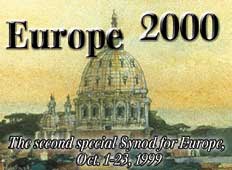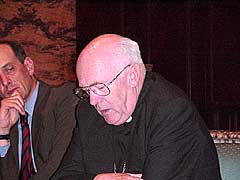

 |
 |
|
|
“No question” Daneels would relish papal challenges By JOHN L. ALLEN JR. 
Cardinal Godfried Daneels did not hesitate when faced with what is, these days, the question any member of the college of cardinals under 80 faces: Would he like to be pope? His answer, basically, was yes. Asked if there was any part of him that would enjoy tackling the challenges awaiting the next pontificate, Daneels said, “there is no question.” And he had some clear ideas as to what those challenges are likely to be. The 66 year-old Belgian cardinal sat down Oct. 20 for an interview with NCR at the Belgian College in Rome. One indication that Daneels is taken seriously as a papabile is that he slotted NCR in just after interviews with French Canadian and Italian TV crews, and just before rushing back to the Vatican to finish work on the synod’s concluding documents. His own intervention in the synod, open to renewal of the church and full of hope about the future, seemed to boost his stock among Vatican-watchers. Asked to name the two or three most important issues facing the next pontificate, Daneels sounded like a man who’s thought carefully about the question. He ticked off three points: the confrontation with modern culture, especially the relationship between faith and science; inter-religious dialogue, especially with the great Asian religions; and the identity of ordained ministry in the church and its relationship with laity. Daneels said the challenge that would most intrigue him about being pope would be working out the dialogue with culture. “One is speaking here about the evolution of mankind,” he said. “There’s a new type of man being born. How to evangelize this man, the man of the 21st century, the man of the next millennium - that’s fascinating.” Daneels said, however, that he doesn’t spend time wondering what life might be like if he is elected. “Fortunately I don’t have any time at all to think about it,” he said. “It would be terrible if I had time to do that.” When the next conclave takes place, Daneels could be a favorite of the moderates should Cardinal Carlo Maria Martini of Milan falter. A former professor of liturgy at the Catholic University of Louvain, Daneels has a reputation for caution, but that may appeal to cardinals who feel this papacy has moved too far, too fast, on too many issues. One uncertainty about Daneels is his health - in late 1997, he had a serious heart attack. Others say that Daneels lacks warmth, that he comes alive on a platform but is incapable of the one-on-one backslapping and bonhomie any successful politician must practice. Daneels’ reputation was also sullied in 1998, when a Belgian court found him and his archdiocese negligent in the supervision of a priest charged with sexually abusing children. Andre Vander Lijn, 63, was accused of having abused 10 children in his Brussels parish over 30 years. After legal proceedings were initiated against Vander Lijn, Daneels wrote to government officials asking them to “exercise prudence” in their treatment of “an excellent priest.” Despite these question marks, many observers say Daneels still has much going for him - long experience as a pastor, keen intelligence, and a reputation as a moderate that makes him popular across ideological lines. One could expect curial reform from a Daneels papacy. Among other things, he says he is open to appointing laity, including women, to run curial agencies. “Why not?” he said. “In the congregation for laity, for example, it would only make sense.” Daneels added that religious superiors of women’s orders also have valuable experience that should be tapped at the highest levels of the curia. “In my diocese, there are women superiors who have more to say about what happens than I do, because they have more sisters than I have priests,” Daneels said. As for the synod, Daneels said judging its importance must await the concluding document issued by the pope next year. Pressed for immediate perceptions, he said only, “Every synod is a success, and every synod is also a disaster.” He acknowledged that it’s irritating for bishops to have to wait a year for a document written by someone else to find out whether their own meeting accomplished anything. “It’s not very agreeable, not very pleasant, of course,” Daneels said. But he also said that the bishops themselves must bear part of the blame for not advancing a more concrete and coherent vision of how things might be done differently. “It lacks a kind a systematic approach,” Daneels said. “We are always happy to meet one another, and that encounter is indispensable. For the heart it is an excellent thing, but we could be more intelligent.” “Bishops are excellent people in their hearts,” Daneels said, “but sometimes we could use some more light in the head.” John L. Allen Jr. may be reached at JLA12065@aol.com National Catholic Reporter, October 21, 1999 |